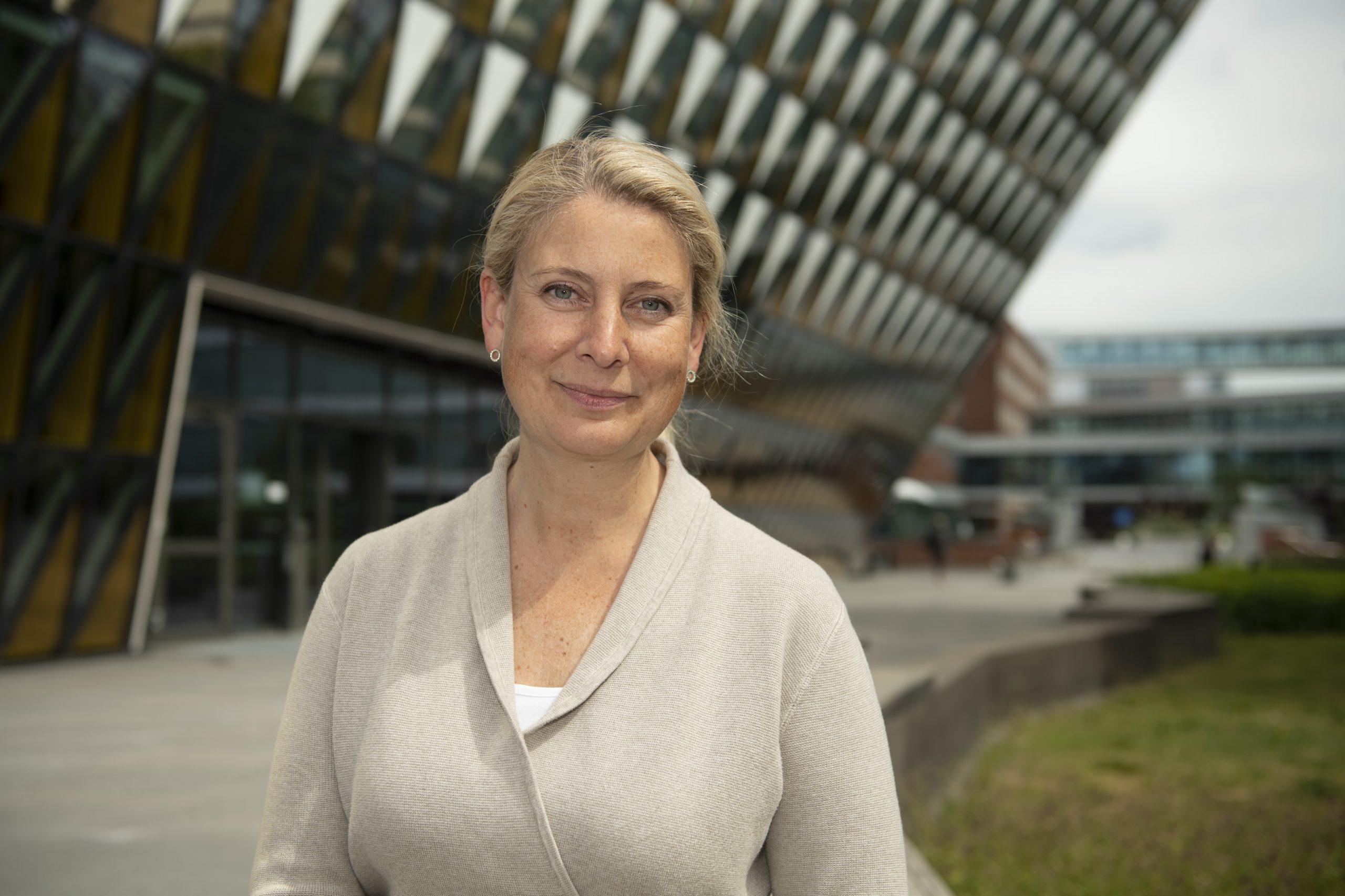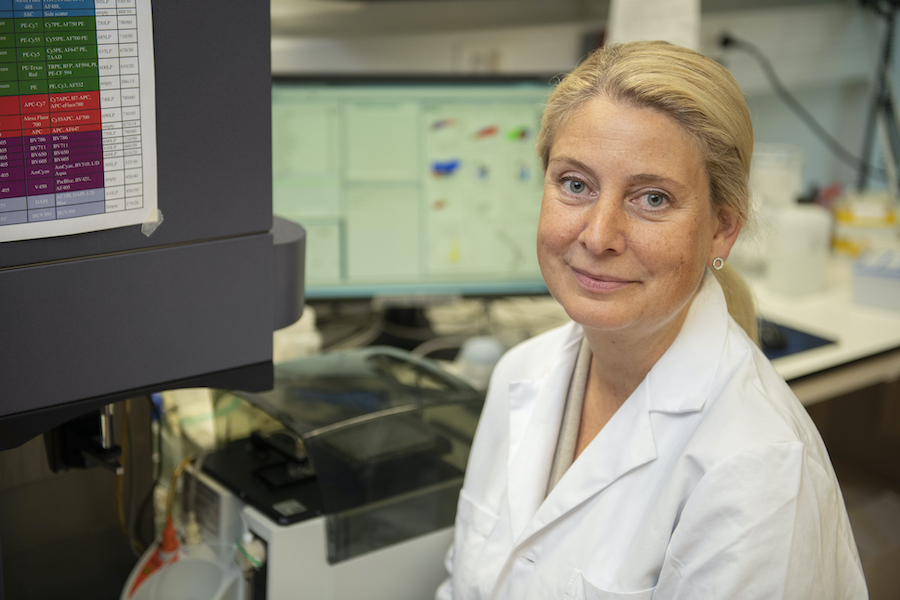COVID-19, the disease caused by SARS-CoV-2, is seriously disrupting our lives and our way of life. Now more than ever, we need science and research to help us overcome what is arguably, the biggest immediate challenge of our generation.
One of the striking features of COVID-19 is the big differences between how we react to being infected with SARS-CoV-2. Some show no symptoms while others get seriously ill and die. Factors like genetics, environment, lifestyle, and pre-existing conditions contribute to disease severity, but what about the immune system? Could it play an important role?
To answer these questions, we talked to Dr. Anna Smed-Sörensen, an associate professor in the Department of Medicine Solna, at Karolinska Institutet (KI) in Sweden. Anna is an expert on immune responses to respiratory infections, specifically influenza. These days, she is applying her expertise to SARS-CoV-2.
 Dr. Anna Smed-Sörensen (image: Ulf Sirborn)
Dr. Anna Smed-Sörensen (image: Ulf Sirborn)
Academic Positions: Anna, thank you for taking the time to speak with us. Can you start by telling us more about your SARS-CoV-2 project? What is your goal with this study?
Anna Smed-Sörensen: My research group focuses on translational medical research, where we link our experimental work with clinical observations. We have an ongoing study in patients with influenza-like illness and confirmed respiratory viral infection that looks at immune responses in the upper and lower respiratory system and in blood. Since respiratory symptoms are part of the inclusion criteria for this study, we were well placed to study the immune responses to SARS-CoV-2 when it emerged in Sweden earlier this year.
Our goal is to understand the immunological responses in the respiratory system as well as systemic immune responses and how this correlates with disease severity. For both influenza and COVID-19, there is a wide span of how sick you get. While there are many factors that influence the severity, we look into the immunological side. We examine how the immune system responds to the pathogen by monitoring different aspects of the immune system in patients with different severity and follow these responses over time.
Academic Positions: Based on the data that you have so far, do you see any correlation between immune response and disease severity?
Anna: The simple answer is yes. While we are still very much in the process of generating data we do already see differences. Some are the same as those already reported by other labs, such as a reduction in white blood cells and an increase in an important immune molecule called IL-6. However, unexpectedly we did not find much of another important immune molecule called type 1 interferon in patients with severe COVID-19. We usually see type 1 interferon in patients with influenza and this difference may help explain why we should not see COVID-19 as just another respiratory disease.
Academic Positions: What would be some of the real-world implications of these findings?
Anna: My lab (and others) are looking to identify potential biomarkers that would allow healthcare workers to predict how severe the disease will be and how it will progress in a particular patient and thereby provide appropriate care. Our work will also help in drug and vaccine development. Before we have a vaccine, we rely on the patient's immune system to combat the disease and it is vital that our drugs do not negatively affect our immune responses against SARS-CoV-2.
Academic Positions: One of the challenges in understanding the human immune system is access to clinical samples. How has being at KI helped your research group access samples?
Anna: I must say that we have a fantastic setting. Karolinska Institutet and Karolinska University Hospital have a long tradition of working together. The Swedish healthcare system is well integrated with the university system and we are aided by the fact that there is one uniform national healthcare system. All of these factors facilitate collaboration that has enabled my research group to set up a study to include and sample patients, generating unique patient samples that we analyze in the lab.
Academic Positions: As someone leading a group studying SARS-CoV-2, the health and safety of your group must be top of mind, not to mention the pressure of the high expectations for your results. How do you lead during such challenging times?
Anna: In Sweden we generally have flat organizations. I am of course in charge, make the final calls, and am responsible for the work environment and safety issues (and I definitely feel this on my shoulders) but we do a lot of consensus decision making. For example, when we realized that we would be including COVID-19 samples with our inclusion criteria, we paused the study, reviewed our risk assessments and discussed the pros and cons together as a team. If we had concluded that it was too risky to continue the study, we would have stopped.
I think it is important to anchor decisions within the group because it is not only a safety issue but also a motivation issue. We have worked around the clock in the past few months and if it is motivated by genuine desire to learn more about this, then it is worth it and people have been very willing to work a lot.
Academic Positions: The group make-up must be very important then. How important is it to you to have a diverse group?
Anna: It’s definitely important, especially for a small country like Sweden. When I was a PhD student here at KI some twenty years ago, it was more common to have all Swedish labs. But these days we have people from everywhere. When I have positions open, I choose the best candidates and so far they have been from India, China, Germany, Finland, Sweden, all over the world. Transitioning yourself into a new environment, new country, new lab, forces you to reinvent yourself on many levels, which is important for long-term career success.
Academic Positions: Yes, we certainly agree! Thank you so much for sharing your story with us Anna.
Header image: Ulf Sirborn
Arbeitgeber im Fokus
Karolinska Institutet's mission is to contribute to the improvement of human health through research and education.
See all current vacanciesArbeitgeber im Fokus
Karolinska Institutet's mission is to contribute to the improvement of human health through research and education.
Arbeitgeberseite besuchenAusgewählte/r Forscher/in
Dr. Anna Smed-Sörensen is an associate professor in the Department of Medicine, at Karolinska Institutet (KI) in Sweden. Anna is an expert on immune responses to respiratory infections, specifically influenza.
